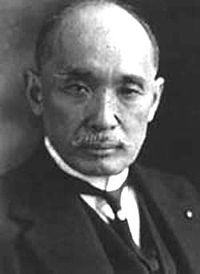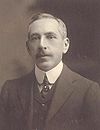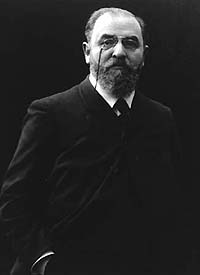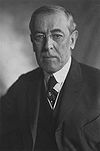
Racial Equality Proposal, 1919
Encyclopedia
The Racial Equality Proposal was a Japan
ese proposal for racial equality
at the Paris Peace Conference
.




 After the end of seclusion, Japan suffered unequal treaties
After the end of seclusion, Japan suffered unequal treaties
and demanded equal status with the Powers. In this context, the Japanese delegation to the Paris peace conference proposed the "racial equality clause" in the Covenant of the League of Nations
. The first draft was presented to the League of Nations Commission on 13 February as an amendment to Article 21:
The Japanese delegation did not realize the full ramifications of their proposal, since its adoption would have challenged the established norms of the (Western dominated) international system of the day, which involved the colonial subjugation of non-white people
s. In the view of the Japanese delegation, they were only asking that the League of Nations should accept the equality of Japanese nationals; however, a universalist meaning and implication of the proposal became attached to it within the delegation, which drove its contentiousness at the conference.
Australian Prime Minister Billy Hughes
clarified his opposition and announced at a meeting that
Then Nobuaki Makino announced at a press conference.
The proposal was also problematic for U.S. President Woodrow Wilson
, who knew he was dependent on pro-segregation
Southern
Democrats
if he was to have any hope of getting the two thirds majority needed to ratify the final treaty in the United States Senate
. The presence of such strong opposition from the British Empire delegations was undoubtedly a relief to Wilson as it gave him a pretext to scupper the proposal.
spoke for the British Empire and addressed opposition to the proposal. Italian Prime Minister Vittorio Orlando spoke in favor of the statement on Human rights
. French Senator Léon Bourgeois
urged adoption and stated that it would be impossible to reject this proposal that embodied "an indisputable principle of justice".
The proposal received a majority vote on the day. 11 of the 17 delegates present voted in favor of its amendment to the charter, and no negative vote was taken. The votes for the amendment tallied thus:
Total: 11 Yes
The chairman, President Wilson, overturned it, saying that although the proposal had been approved by a clear majority, that in this particular matter, strong opposition had manifested itself, and that on this issue a unanimous vote would be required. This strong opposition came from the British delegation. French Delegate Ferdinand Larnaude immediately stated "A majority had voted for the amendment". The Japanese delegation wanted the transcript to show that a clear majority had been voted for the the amendment to the Charter.
Though the proposal itself was compatible with British stance of equality for all subjects as a principle for maintaining imperial unity, there were significant deviations in the stated interests of its Dominions, notably Australia. As it risked undermining the White Australia Policy
, then Prime Minister of Australia Billy Hughes and Joseph Cook
vigorously opposed the proposal behind the scenes, and so advocated against it through the British delegation. Without the support of its Dominions, the British delegation could not take such a stand on principle. According to Cecil
, the delegate representing the British Empire at the Conference, in his diary
occurred by the American deliberate inaction. Although the exclusion of the racial equality proposal allowed Wilson to keep Southern Democratic allies on his side, this proved insufficient to get the treaty ratified by the United States Senate
. The U.S. never joined the League of Nations.
As such, this point could be listed among the many causes of conflict which led to World War II
, which were left unaddressed at the close of World War I
.
The rejection of the racial equality clause proved to be an important factor in turning Japan away from cooperation with the West and toward nationalistic policies. In 1923, the Anglo-Japanese Alliance
expired, which gradually resulted in a closer relationship of Japan and Italy to Germany. Despite this tie to Germany, which in the years following promulgated anti-semitism
after the Nazis gained power, Japan decided to prohibit the expulsion of the Jews
from Japan, Manchuria, and China in accordance with the spirit of racial equality and advocated the political slogan Hakkō ichiu
.
The mood of the international system changed dramatically by 1945, so that this contentious point of racial equality would be incorporated into the United Nations Charter
in 1945 as the fundamental principle of international justice. The Civil Rights Act
was enforced in 1964, while Apartheid was abolished in 1994.
Japan
Japan is an island nation in East Asia. Located in the Pacific Ocean, it lies to the east of the Sea of Japan, China, North Korea, South Korea and Russia, stretching from the Sea of Okhotsk in the north to the East China Sea and Taiwan in the south...
ese proposal for racial equality
Racial equality
Racial equality means different things in different contexts. It mostly deals with an equal regard to all races.It can refer to a belief in biological equality of all human races....
at the Paris Peace Conference
Paris Peace Conference, 1919
The Paris Peace Conference was the meeting of the Allied victors following the end of World War I to set the peace terms for the defeated Central Powers following the armistices of 1918. It took place in Paris in 1919 and involved diplomats from more than 32 countries and nationalities...
.
The proposal





Unequal Treaties
“Unequal treaty” is a term used in specific reference to a number of treaties imposed by Western powers, during the 19th and early 20th centuries, on Qing Dynasty China and late Tokugawa Japan...
and demanded equal status with the Powers. In this context, the Japanese delegation to the Paris peace conference proposed the "racial equality clause" in the Covenant of the League of Nations
Covenant of the League of Nations
-Creation:Early drafts for a possible League of Nations began even before the end of the First World War. A London-based study group led by James Bryce and G. Lowes Dickinson made proposals adopted by the British League of Nations Society, founded in 1915. Another group in the United States—which...
. The first draft was presented to the League of Nations Commission on 13 February as an amendment to Article 21:
The equality of nations being a basic principle of the League of Nations, the High Contracting Parties agree to accord as soon as possible to all alien nationals of states, members of the League, equal and just treatment in every respect making no distinction, either in law or in fact, on account of their race or nationality.
The Japanese delegation did not realize the full ramifications of their proposal, since its adoption would have challenged the established norms of the (Western dominated) international system of the day, which involved the colonial subjugation of non-white people
White people
White people is a term which usually refers to human beings characterized, at least in part, by the light pigmentation of their skin...
s. In the view of the Japanese delegation, they were only asking that the League of Nations should accept the equality of Japanese nationals; however, a universalist meaning and implication of the proposal became attached to it within the delegation, which drove its contentiousness at the conference.
Australian Prime Minister Billy Hughes
Billy Hughes
William Morris "Billy" Hughes, CH, KC, MHR , Australian politician, was the seventh Prime Minister of Australia from 1915 to 1923....
clarified his opposition and announced at a meeting that
ninety-five out of one hundred Australians rejected the very idea of equality.
Then Nobuaki Makino announced at a press conference.
We are not too proud to fight but we are too proud to accept a place of admitted inferiority in dealing with one or more of the associated nations. We want nothing but simple justice.
The proposal was also problematic for U.S. President Woodrow Wilson
Woodrow Wilson
Thomas Woodrow Wilson was the 28th President of the United States, from 1913 to 1921. A leader of the Progressive Movement, he served as President of Princeton University from 1902 to 1910, and then as the Governor of New Jersey from 1911 to 1913...
, who knew he was dependent on pro-segregation
Racial segregation
Racial segregation is the separation of humans into racial groups in daily life. It may apply to activities such as eating in a restaurant, drinking from a water fountain, using a public toilet, attending school, going to the movies, or in the rental or purchase of a home...
Southern
Southern United States
The Southern United States—commonly referred to as the American South, Dixie, or simply the South—constitutes a large distinctive area in the southeastern and south-central United States...
Democrats
Democratic Party (United States)
The Democratic Party is one of two major contemporary political parties in the United States, along with the Republican Party. The party's socially liberal and progressive platform is largely considered center-left in the U.S. political spectrum. The party has the lengthiest record of continuous...
if he was to have any hope of getting the two thirds majority needed to ratify the final treaty in the United States Senate
United States Senate
The United States Senate is the upper house of the bicameral legislature of the United States, and together with the United States House of Representatives comprises the United States Congress. The composition and powers of the Senate are established in Article One of the U.S. Constitution. Each...
. The presence of such strong opposition from the British Empire delegations was undoubtedly a relief to Wilson as it gave him a pretext to scupper the proposal.
April 11
On April 11, 1919, the commission held a final session. Makino stated the Japanese plea for human rights and racial equality. British representative Robert CecilRobert Cecil, 1st Viscount Cecil of Chelwood
Edgar Algernon Robert Gascoyne-Cecil, 1st Viscount Cecil of Chelwood CH, PC, QC , known as Lord Robert Cecil from 1868 to 1923, was a lawyer, politician and diplomat in the United Kingdom...
spoke for the British Empire and addressed opposition to the proposal. Italian Prime Minister Vittorio Orlando spoke in favor of the statement on Human rights
Human rights
Human rights are "commonly understood as inalienable fundamental rights to which a person is inherently entitled simply because she or he is a human being." Human rights are thus conceived as universal and egalitarian . These rights may exist as natural rights or as legal rights, in both national...
. French Senator Léon Bourgeois
Léon Bourgeois
-Biography:He was born in Paris, and was trained in law. After holding a subordinate office in the department of public works, he became successively prefect of the Tarn and the Haute-Garonne , and then returned to Paris to enter the ministry of the interior...
urged adoption and stated that it would be impossible to reject this proposal that embodied "an indisputable principle of justice".
The proposal received a majority vote on the day. 11 of the 17 delegates present voted in favor of its amendment to the charter, and no negative vote was taken. The votes for the amendment tallied thus:
- JapanJapanJapan is an island nation in East Asia. Located in the Pacific Ocean, it lies to the east of the Sea of Japan, China, North Korea, South Korea and Russia, stretching from the Sea of Okhotsk in the north to the East China Sea and Taiwan in the south...
(2) Yes - FranceFranceThe French Republic , The French Republic , The French Republic , (commonly known as France , is a unitary semi-presidential republic in Western Europe with several overseas territories and islands located on other continents and in the Indian, Pacific, and Atlantic oceans. Metropolitan France...
(2) Yes - ItalyItalyItaly , officially the Italian Republic languages]] under the European Charter for Regional or Minority Languages. In each of these, Italy's official name is as follows:;;;;;;;;), is a unitary parliamentary republic in South-Central Europe. To the north it borders France, Switzerland, Austria and...
(2) Yes - BrazilBrazilBrazil , officially the Federative Republic of Brazil , is the largest country in South America. It is the world's fifth largest country, both by geographical area and by population with over 192 million people...
(1) Yes - Republic of ChinaRepublic of ChinaThe Republic of China , commonly known as Taiwan , is a unitary sovereign state located in East Asia. Originally based in mainland China, the Republic of China currently governs the island of Taiwan , which forms over 99% of its current territory, as well as Penghu, Kinmen, Matsu and other minor...
(1) Yes - GreeceGreeceGreece , officially the Hellenic Republic , and historically Hellas or the Republic of Greece in English, is a country in southeastern Europe....
(1) Yes - SerbiaSerbiaSerbia , officially the Republic of Serbia , is a landlocked country located at the crossroads of Central and Southeast Europe, covering the southern part of the Carpathian basin and the central part of the Balkans...
(1) Yes - CzechoslovakiaCzechoslovakiaCzechoslovakia or Czecho-Slovakia was a sovereign state in Central Europe which existed from October 1918, when it declared its independence from the Austro-Hungarian Empire, until 1992...
(1) Yes
Total: 11 Yes
- British EmpireBritish EmpireThe British Empire comprised the dominions, colonies, protectorates, mandates and other territories ruled or administered by the United Kingdom. It originated with the overseas colonies and trading posts established by England in the late 16th and early 17th centuries. At its height, it was the...
(2) - Not Registered - United StatesUnited StatesThe United States of America is a federal constitutional republic comprising fifty states and a federal district...
(2) - Not Registered - PortugalPortugalPortugal , officially the Portuguese Republic is a country situated in southwestern Europe on the Iberian Peninsula. Portugal is the westernmost country of Europe, and is bordered by the Atlantic Ocean to the West and South and by Spain to the North and East. The Atlantic archipelagos of the...
(1) - Not Registered - RomaniaRomaniaRomania is a country located at the crossroads of Central and Southeastern Europe, on the Lower Danube, within and outside the Carpathian arch, bordering on the Black Sea...
(1) - Not Registered - BelgiumBelgiumBelgium , officially the Kingdom of Belgium, is a federal state in Western Europe. It is a founding member of the European Union and hosts the EU's headquarters, and those of several other major international organisations such as NATO.Belgium is also a member of, or affiliated to, many...
(2) - absent
The chairman, President Wilson, overturned it, saying that although the proposal had been approved by a clear majority, that in this particular matter, strong opposition had manifested itself, and that on this issue a unanimous vote would be required. This strong opposition came from the British delegation. French Delegate Ferdinand Larnaude immediately stated "A majority had voted for the amendment". The Japanese delegation wanted the transcript to show that a clear majority had been voted for the the amendment to the Charter.
Though the proposal itself was compatible with British stance of equality for all subjects as a principle for maintaining imperial unity, there were significant deviations in the stated interests of its Dominions, notably Australia. As it risked undermining the White Australia Policy
White Australia policy
The White Australia policy comprises various historical policies that intentionally restricted "non-white" immigration to Australia. From origins at Federation in 1901, the polices were progressively dismantled between 1949-1973....
, then Prime Minister of Australia Billy Hughes and Joseph Cook
Joseph Cook
Sir Joseph Cook, GCMG was an Australian politician and the sixth Prime Minister of Australia. Born as Joseph Cooke and working in the coal mines of Silverdale, Staffordshire during his early life, he emigrated to Lithgow, New South Wales during the late 1880s, and became General-Secretary of the...
vigorously opposed the proposal behind the scenes, and so advocated against it through the British delegation. Without the support of its Dominions, the British delegation could not take such a stand on principle. According to Cecil
Robert Cecil, 1st Viscount Cecil of Chelwood
Edgar Algernon Robert Gascoyne-Cecil, 1st Viscount Cecil of Chelwood CH, PC, QC , known as Lord Robert Cecil from 1868 to 1923, was a lawyer, politician and diplomat in the United Kingdom...
, the delegate representing the British Empire at the Conference, in his diary
...it is curious how all the foreigners perpetually harp on principle and right and other abstractions, whereas the Americans and still more the British are only considering what will give the best chance to the League of working properly.
Reaction
In the end, Cecil felt that British support for the League of Nations was a more crucial goal. The Japanese media fully covered the progress of the conference, leading to an alienation of Japanese public opinion towards the United States of America, leading to broader conflicts later on. In the United States, racial riotsRed Summer of 1919
Red Summer describes the race riots that occurred in more than three dozen cities in the United States during the summer and early autumn of 1919. In most instances, whites attacked African Americans. In some cases groups of blacks fought back, notably in Chicago, where, along with Washington, D.C....
occurred by the American deliberate inaction. Although the exclusion of the racial equality proposal allowed Wilson to keep Southern Democratic allies on his side, this proved insufficient to get the treaty ratified by the United States Senate
United States Senate
The United States Senate is the upper house of the bicameral legislature of the United States, and together with the United States House of Representatives comprises the United States Congress. The composition and powers of the Senate are established in Article One of the U.S. Constitution. Each...
. The U.S. never joined the League of Nations.
As such, this point could be listed among the many causes of conflict which led to World War II
World War II
World War II, or the Second World War , was a global conflict lasting from 1939 to 1945, involving most of the world's nations—including all of the great powers—eventually forming two opposing military alliances: the Allies and the Axis...
, which were left unaddressed at the close of World War I
World War I
World War I , which was predominantly called the World War or the Great War from its occurrence until 1939, and the First World War or World War I thereafter, was a major war centred in Europe that began on 28 July 1914 and lasted until 11 November 1918...
.
The rejection of the racial equality clause proved to be an important factor in turning Japan away from cooperation with the West and toward nationalistic policies. In 1923, the Anglo-Japanese Alliance
Anglo-Japanese Alliance
The first was signed in London at what is now the Lansdowne Club, on January 30, 1902, by Lord Lansdowne and Hayashi Tadasu . A diplomatic milestone for its ending of Britain's splendid isolation, the alliance was renewed and extended in scope twice, in 1905 and 1911, before its demise in 1921...
expired, which gradually resulted in a closer relationship of Japan and Italy to Germany. Despite this tie to Germany, which in the years following promulgated anti-semitism
Anti-Semitism
Antisemitism is suspicion of, hatred toward, or discrimination against Jews for reasons connected to their Jewish heritage. According to a 2005 U.S...
after the Nazis gained power, Japan decided to prohibit the expulsion of the Jews
Jews
The Jews , also known as the Jewish people, are a nation and ethnoreligious group originating in the Israelites or Hebrews of the Ancient Near East. The Jewish ethnicity, nationality, and religion are strongly interrelated, as Judaism is the traditional faith of the Jewish nation...
from Japan, Manchuria, and China in accordance with the spirit of racial equality and advocated the political slogan Hakkō ichiu
Hakko ichiu
was a Japanese political slogan that became popular from the Second Sino-Japanese War to World War II, and was popularized in a speech by Prime Minister of Japan Fumimaro Konoe on January 8, 1940.-Outline:...
.
The mood of the international system changed dramatically by 1945, so that this contentious point of racial equality would be incorporated into the United Nations Charter
United Nations Charter
The Charter of the United Nations is the foundational treaty of the international organization called the United Nations. It was signed at the San Francisco War Memorial and Performing Arts Center in San Francisco, United States, on 26 June 1945, by 50 of the 51 original member countries...
in 1945 as the fundamental principle of international justice. The Civil Rights Act
Civil Rights Act
Civil Rights Act may refer to several acts in the history of civil rights in the United States, including:-Federal legislation:* Civil Rights Act of 1866, extending the rights of emancipated slaves...
was enforced in 1964, while Apartheid was abolished in 1994.

